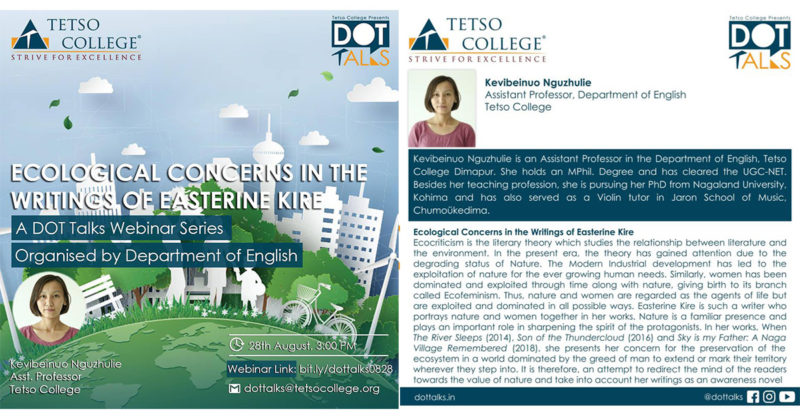The DOT Talks webinar on the above mentioned topic was held on 28th August 2020 with resource person Kevibeinuo Nguzhulie, Assistant Professor, Department of English who explored the literary theories of Ecocriticism in the writings of Naga author Easterine Kire.
In an attempt to redirect the mind of the readers towards the value of nature for man and take into account Kire’s writings as an awareness novel, Kevibeinuo defined ecocriticism or environmental criticism as a literary theory which studies the relationship between literature and the environment and stated that in the present era, the theory has gained attention due to the degrading status of Nature due to modern industrial development and exploitation of nature for the ever growing human needs.
Examining Kire’s novels, the resource speaker stated that her writings revolve around the people and environment of Nagaland. The backdrop of each of her novels is drawn from Kire’s Naga roots and tells a story with the hills and its rocks and trees, she stated. While her novels are multi-layered with different elements and issues, they also depict the socio-cultural life of the Naga people, Kevibeinuo added.
In When the River Sleeps (2014), Kevibeinuo highlighted the indispensable dependence of man on nature where Kire meticulously lists a variety of herbs useful for man. It also presents the people’s knowledge on natural remedies and how people can make a living or survive through nature, she said.
The resource speaker also presented her concern for the preservation of the ecosystem in a world dominated by the greed of man to extend or mark their territory wherever they step into by examining themes and motifs in Son of the Thundercloud (2016) and Sky is my Father: A Naga Village Remembered (2018).
In conclusion, Kevibeinuo stated that many writers have attempted to highlight ecological concerns through their writings and it was up to the readers to apply them in practice. She further urged all the participants to respect, conserve and preserve nature as best we can for future generations.

